-
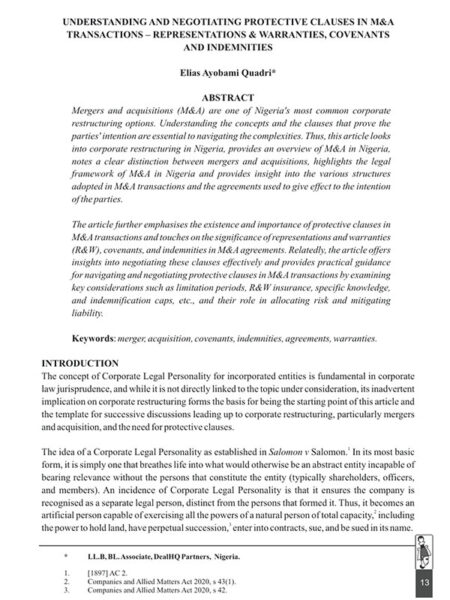
Understanding and Negotiating Protective Clauses in M&A Transactions – Representations & Warranties, Covenants & Indemnities
0₦2,500.00Elias Ayobami Quadri, in his article, Understanding and Negotiating Protective Clauses in M&A Transactions – Representations & Warranties, Covenants and Indemnities, discusses the legal effect of representation, warranties, covenants and indemnities in merger and acquisition transactions. In corporate restructurings, a clear understanding of the concepts and the clauses that evidence the intention of the parties are essential to navigating the complexities present therein. Elias looks into corporate restructuring in Nigeria, provides an overview of M&A in Nigeria, noting a clear distinction between mergers and acquisition, highlighting the legal framework of M&A in Nigeria, and providing insight into the various structures adopted in M&A transactions and the agreements used to give effect to the intention of the parties. Elias further emphasizes the existence and importance of protective clauses in M&A transactions and touches on the significance of representations and warranties (R&W), covenants, and indemnities in M&A agreements. Relatedly, Elias offers insights into negotiating these clauses effectively, and provides practical guidance for navigating and negotiating protective clauses in M&A transactions by examining key considerations such as limitation periods, R&W insurance, specific knowledge, and indemnification caps, etc., and its role in allocating risk and mitigating liability.
-
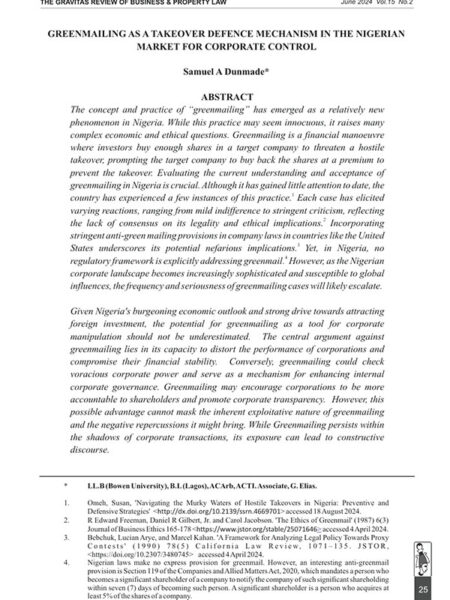
Greenmailing as a Takeover Defence Mechanism in the Nigerian Market for Corporate Control
0₦2,500.00Samuel A. Dunmade, in his article, Greenmailing as a Takeover Defence Mechanism in the Nigerian Market for Corporate Control, examines the concept and practice of “greenmailing” as a relatively new phenomenon in Nigeria. Put simply, greenmailing is a financial manoeuvre where investors buy enough shares in a target company to threaten a hostile takeover thereby prompting the target company to buy back the shares at a premium to prevent the takeover. Whilst this practice may seem innocuous on its surface, it raises a host of complex economic and ethical questions. It is crucial to evaluate the current understanding and acceptance of greenmailing in Nigeria. Although it has gained little attention to date, the country has experienced a few instances of this practice. Each case has elicited varying reactions, ranging from mild indifference to stringent criticism, a reflection of the lack of consensus on its legality and ethical implications. The incorporation of stringent anti-green mailing provisions in company laws in countries like the United States underscores its potential nefarious implications. Yet, in Nigeria, no regulatory framework is explicitly addressing greenmail. However, as the Nigerian corporate landscape becomes increasingly sophisticated and susceptible to global influences, the frequency and seriousness of greenmailing cases will likely escalate.
-
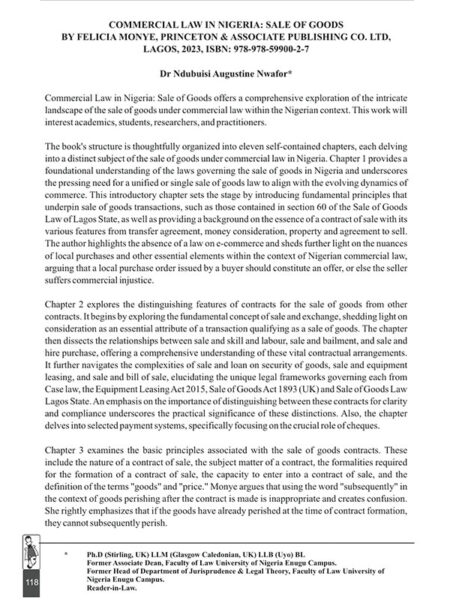
Book Review: Commercial Law in Nigeria: Sale of Goods
0₦2,500.00Dr. Ndubuisi Nwafor offers a comprehensive review of a work by a renowned author on Commercial Law in Nigeria. The Book – Commercial Law in Nigeria: Sale of Goods published in 2023 offers a comprehensive exploration of the intricate landscape of the sale of goods under commercial law within the Nigerian context. Structurally organised in eleven chapters, each delving into a distinct subject of sale of goods, the book offers a source of interesting reading by students, practitioners and members of the judiciary.
-
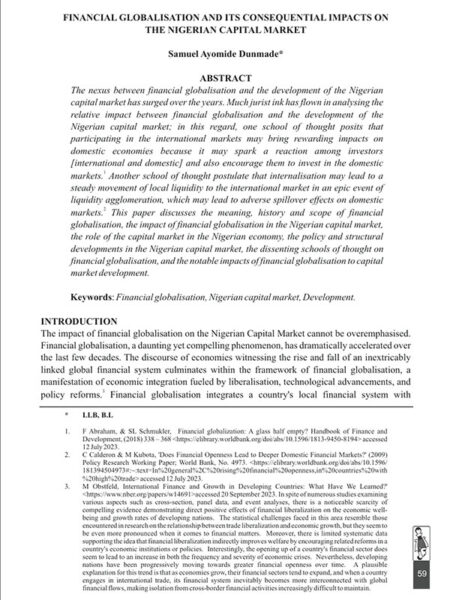
Financial Globalisation and its Consequential Impacts on the Nigerian Capital Market
0₦2,500.00Samuel Dunmade, in his article, Financial Globalisation and its Consequential Impacts on the Nigerian Capital Market, examines the concept of financial globalisation and its impact on the Nigerian capital market. The nexus between financial globalisation and the development of the Nigerian capital market has surged over the years. Much jurist ink has flown in analyzing the relative impact between financial globalisation and the development of the Nigerian capital market; in this regard, one school of thought posits that participating in the international markets may bring rewarding impacts on domestic economies, because it may spark a reaction among investors [international and domestic] and also encourage them to invest in the domestic markets. Another school of thought postulates that the internalization may lead to a steady movement of local liquidity to the international market in an epic event of liquidity agglomeration, which may lead to negative spill-over effects on domestic markets. Dunmade discusses the meaning, history and scope of financial globalization, the impact of financial globalisation in the Nigerian capital market, the role of capital market in the Nigerian economy, the policy and structural developments in the Nigerian capital market, the dissenting schools of thought on financial globalization, and the notable impacts of financial globalisation to capital market development.
-
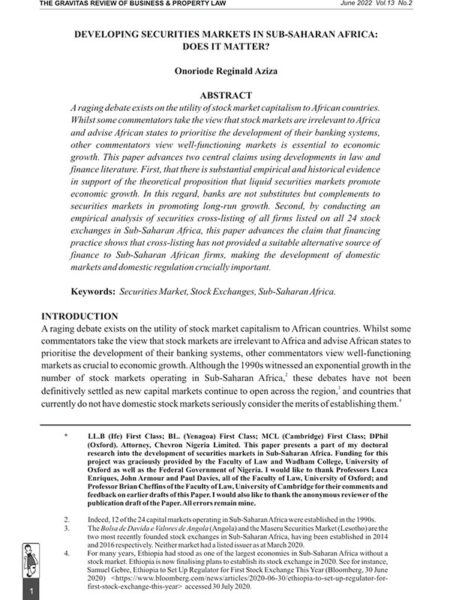
Developing Securities Markets in Sub-Saharan Africa: Does it Matter?
0₦2,500.00Dr Onoriode Aziza of Chevron Nigeria, in his landmark study, Developing Securities Markets in Sub-Saharan Africa: Does it Matter? notes the raging debate on the utility of stock market capitalism to African countries. Whilst some commentators take the view that stock markets are irrelevant to Africa and advise African states to prioritise the development of their banking systems, other commentators view well-functioning markets as essential to economic growth. Dr Aziza advances two central claims using developments in law and finance. First, there is substantial empirical and historical evidence supporting the theoretical proposition that liquid securities markets promote economic growth. In this regard, banks are not substitutes but complement securities markets in promoting long-run growth. Second, by conducting an empirical analysis of securities cross-listing of all firms listed on all 24 stock exchanges in Sub-Saharan Africa, Dr Aziza advances the claim that cross-listing has not provided a suitable alternative source of finance to Sub-Saharan African firms, making the development of domestic markets and regulation crucially important.
-
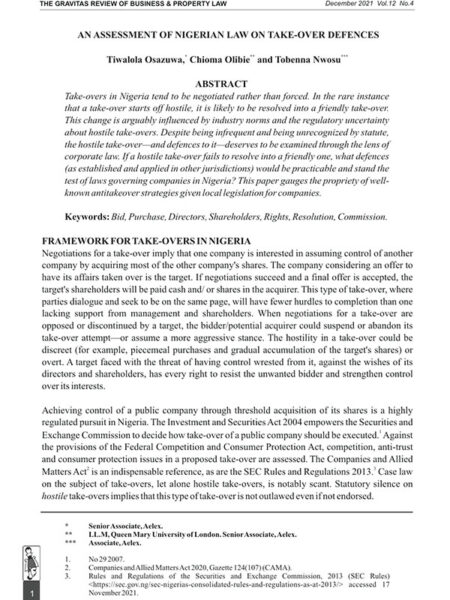
An Assessment of Nigerian Law on Take-Over Defences
0₦2,500.00Tiwalola Osazuwa, Chioma Olibie, and Tobenna Nwosu, all of Aelex in their article, An Assessment of Nigerian Law on Take-Over Defences, note that take-overs in Nigeria tend to be negotiated rather than forced. In the rare instance that a take-over starts off hostile, it is likely to be resolved into a friendly take-over. Though hostile take-over is unrecognised by statute in Nigeria, Osazuwa et al examine the framework for take-overs through the lens of corporate law. They consider take-over devices and defences and well-known anti-takeover strategies.
-
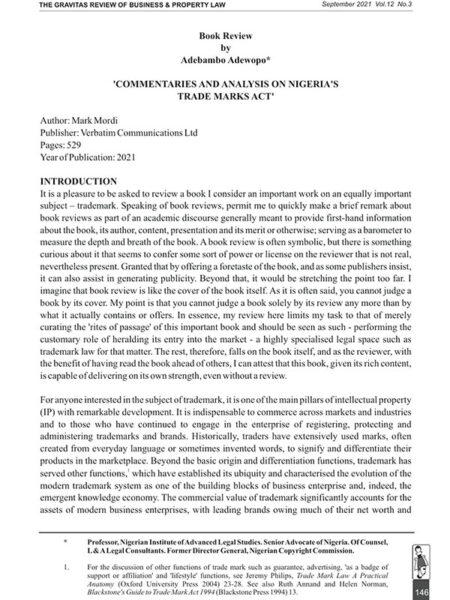
Commentaries and Analysis on Nigeria’s Trade Marks Act
0₦2,500.00Professor Adebambo Adewopo SAN, of the Nigerian Institute of Advanced Legal Studies, and former Director-General, Nigerian Copyright Commission in his brilliant review of Mark Mordi’s new book titled ‘Commentaries and Analysis on Nigeria’s Trade Marks Act’, highlights that the book, a practitioner’s companion, effectively combines the qualitative, quantitative, analytical and conceptual research models to explore the Trade Marks Act landscape.
-
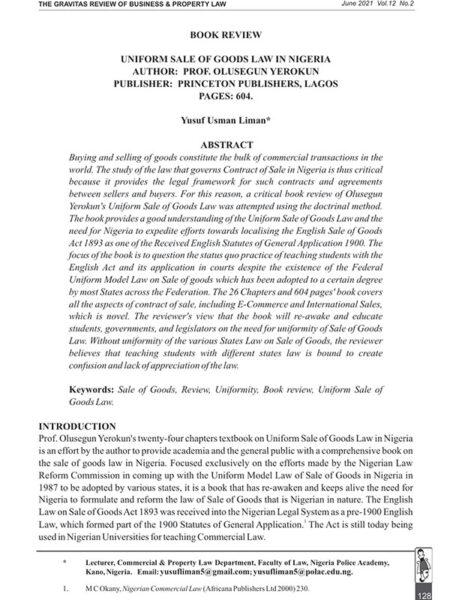
Uniform Sale of Goods Law in Nigeria by Prof. Olusegun Yerokun
0₦2,500.00Yusuf Usman Liman, Lecturer, Faculty of Law, Nigeria Police Academy, Kano Nigeria, reviews the book, Uniform Sale of Goods Law in Nigeria by Prof. Olusegun Yerokun, highlighting that the book provides a good understanding of the need for concerted efforts towards uniformity of the Federal and State Laws on Sale of Goods. Using the review as a backdrop, Liman examines the current state of the law with regards to the status of the Sale of Goods Act 1893, an English Statute of General Application.
-
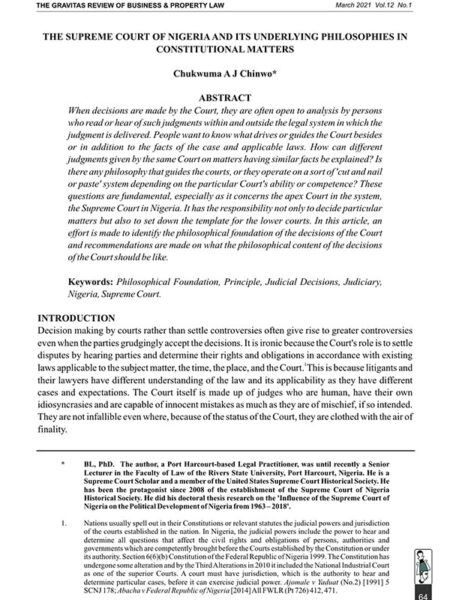
The Supreme Court of Nigeria and its Underlying Philosophies in Constitutional Matters
0₦2,500.00Dr Chukwuma Chinwo, formerly Senior Lecturer at the Rivers State University, and now a Port Harcourt-based Legal Practitioner in his article, The Supreme Court of Nigeria and its Underlying Philosophies in Constitutional Matters, asks a question that bothers many: How can the same Court give different judgments on matters having similar facts? Dr Chinwo examines the Supreme Court of Nigeria’s judicial philosophy. From an extensive review of several Supreme Court decisions, he weaves a coherent thread of factors that influence the Court’s judgments.
-
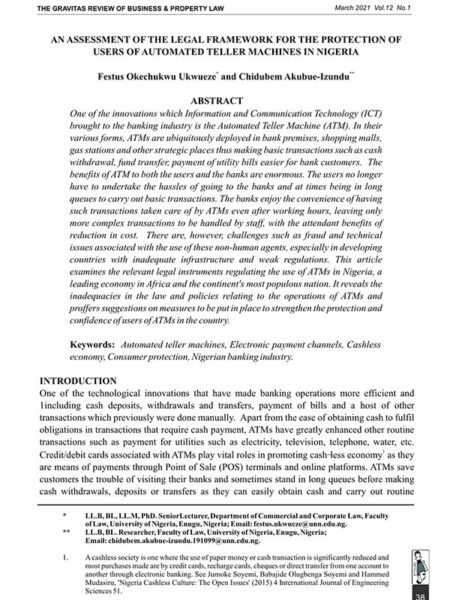
An Assessment of the Legal Framework for the Protection of Users of Automated Teller Machines in Nigeria
0₦2,500.00Dr Festus Ukwueze and Chidubem Akubue-Izundu of the Faculty of Law University of Nigeria Enugu Nigeria in their article, An Assessment of the Legal Framework for the Protection of Users of Automated Teller Machines in Nigeria, note the convenience and benefits of ATMs: faster cash withdrawals, easy fund transfer, convenient payment of utility bills. There are, however, challenges, mainly fraud and technical issues associated with the use of these non-human agents. Dr Ukwueze and Akubue-Izundu comprehensively review the relevant legal instruments regulating the use of ATMs in Nigeria. They posit that the laws and policies relating to ATMs’ operations are inadequate and proffer suggestions on measures to be put in place to strengthen the protection and confidence of users of ATMs in the country.
-
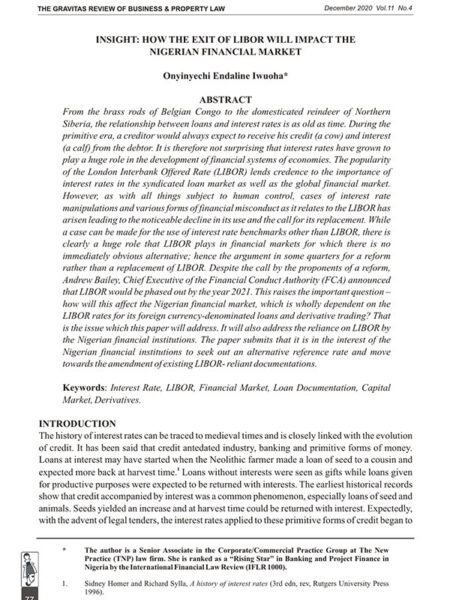
Insight: How the Exit of LIBOR Will Impact the Nigerian Financial Market
0₦2,500.00Onyinyechi Iwuoha, Senior Associate at the TNP Law Firm in her article, Insight: How the Exit of LIBOR Will Impact the Nigerian Financial Market, notes the popularity of the London Interbank Offered Rate (LIBOR) in financial markets worldwide. With the impending phasing out of LIBOR in 2021 by the (UK) Financial Conduct Authority due to what became known as the ‘LIBOR Scandal’, Onyinyenchi addresses how the exit of LIBOR would affect the Nigerian financial market which is wholly dependent on the LIBOR rates for its foreign currency-denominated loans and derivative trading; what alternative reference rates there are, and the amendment of existing LIBOR-reliant documentations.
-
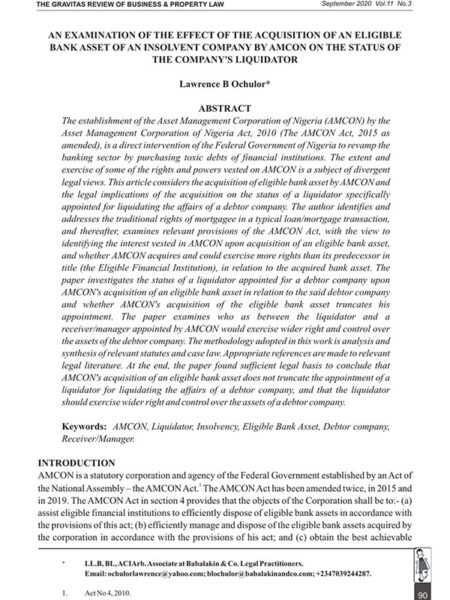
An Examination of the Effect of the Acquisition of An Eligible Bank Asset of an Insolvent Company by AMCON on the Status of the Company’s Liquidator
0₦2,500.00Lawrence Ochulor, Associate at Babalakin & Co. Lagos Nigeria, in his article, An Examination of the Effect of the Acquisition of An Eligible Bank Asset of an Insolvent Company by AMCON on the Status of the Company’s Liquidator, considers the acquisition of an eligible bank asset by AMCON and the legal implications of the acquisition on the status of a liquidator specifically appointed for liquidating the affairs of a debtor company. Lawrence interrogates the traditional rights of a mortgagee in a typical loan/mortgage transaction, the interest vested in AMCON on the acquisition of an eligible bank asset, whether AMCON acquires and could exercise more rights than its predecessor in title concerning the acquired bank asset, the status of a liquidator appointed for a debtor company, and whether AMCON’s acquisition of the eligible bank asset truncates the liquidator’s appointment
The Gravitas Review of Business & Property Law



